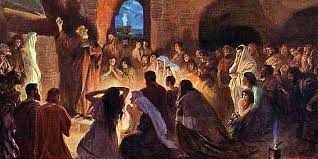The Acts of the Apostles or just Acts, is the fifth book of the New Testament; it recounts the establishing of the Christian Church and the spread of its message to the Roman Empire.
Acts and the Gospel of Luke make up a two-section work, Luke-Acts, by the equivalent mysterious author. It is generally dated to around 80-90 AD, albeit a few researchers recommend 90-110. The initial segment, the Gospel of Luke, tells how God satisfied his arrangement for the world's salvation through the life, demise, and revival of Jesus of Nazareth, the guaranteed savior. Acts proceeds with the account of Christianity in the first century, starting with the rising of Jesus to Heaven. The early sections, set in Jerusalem, portray the Day of Pentecost (the approaching of the Holy Spirit) and the development of the congregation in Jerusalem. At first, the Jews are open to the Christian message, yet later they betray the adherents of Jesus. Dismissed by the Jews, the message is taken to the Gentiles under the direction of Paul the Apostle. The later sections recount Paul's change, his central goal in Asia Minor and the Aegean, lastly his detainment in Rome, where, as the book closes, he anticipates preliminary.
Luke-Acts is an endeavor to answer a religious issue, to be specific how the Messiah of the Jews came to have a predominantly non-Jewish church; the response it gives is that the message of Christ was shipped off the Gentiles on the grounds that the Jews dismissed it. Luke-Acts can likewise be viewed as a safeguard of -or conciliatory sentiment for- the Jesus development addressed to the Jews: the majority of the discourses and lessons in Acts are addressed to Jewish crowds, with the Romans filling in as outside authorities on debates concerning Jewish traditions and law. On the one hand, Luke depicts the devotees of Jesus as an order of the Jews, and hence qualified for lawful insurance as a perceived religion; on the other, Luke appears to be indistinct regarding the future God expects for Jews and Christians, praising the Jewishness of Jesus and his quick adherents while additionally pushing how the Jews had dismissed God's guaranteed Messiah.


